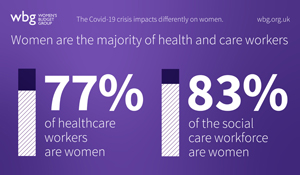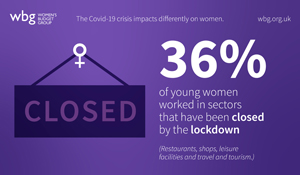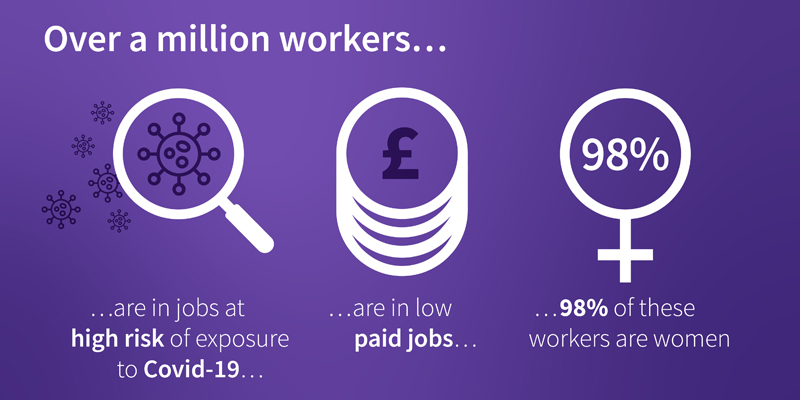Jenna Norman is the public affairs officer at the UK Women’s Budget Group (WBG), where she seeks to increase the group’s profile and influence in Westminster. She is now involved in most COVID-19 work at the WBG and has helped write the ‘Crises Collide: Women and COVID-19’ report, which sets out the immediate impact the crisis is having on different groups of women and makes recommendations for action. Jenna holds an MSc in Gender, Development and Globalisation from the London School of Economics.

“Although the public health emergency has been most fatal for older people, men and Black, Asian and other ethnic minority communities; the economic impact of the pandemic is a disaster for gender justice.”
Campaigning for gender justice
My background is in international work on women’s rights, but my studies helped me question some of the assumptions made in feminism and international development.
I decided I was much more interested in national politics – especially given the austerity and anti-migration policies that were being implemented at the time – so I was fortunate to get my role at the Women’s Budget Group where I work on lots of these issues.
We’re a small team so a lot of our responsibilities overlap, but my main focus is getting our research about intersectional gender-sensitive policy into the hands of people who make policy and laws.
With the help of the team, I do this in a lot of different ways by going to Westminster to meet with parliamentarians and civil servants as well as responding to consultations, for instance – when the Government seeks views on different policies from civil society. I also help write briefings and research reports for the group because we get lots of requests for data and policy recommendations.
WBG has been going for over thirty years now so it has a rich history of bringing economics to feminism and feminism to economics.
It started with a group of academic researchers, policy experts and campaigners coming together to do a gendered analysis of the Chancellor’s budget each year. This is still the bread and butter of what we do to this day and many of the same women are still involved. We also now have a small staff team dedicated to disseminating our work on gender-responsive budgeting.
We produce reactive analysis of the gender impact of economic policy – as it intersects with other equalities of race, class and disability – as well as proactive reports which make recommendations for a more gender-equal economy.
How COVID-19 has impacted gender balance
It’s been a very busy few months adjusting to working from home and trying to keep up with the events of the pandemic!
All major political and economic developments impact on different groups of women and men differently so as soon as Coronavirus started effecting the UK, we knew it would be a huge area of work for us. We couldn’t have predicted how much it would pivot our work though: although the public health emergency has been most fatal for older people, men and Black, Asian and other ethnic minority communities; the economic impact of the pandemic is a disaster for gender justice.
The last few months have been spent trying to get this message to decision-makers and show them what they need to do to mitigate the worst impacts. We’ve done this through a series of reports on migrant women and local impacts for example, briefings on the Government’s announcements, polling different groups of women about their experiences, digital events and social media interaction.
More recently, we’ve been looking ahead to how the economy might change post-Coronavirus and advocating for a care-led recovery which has many environmental and economic benefits.
In the midst of lockdown, we also saw renewed attention to the plight of racial inequality in the UK, which has asked new and age-old questions of our work about how it is prioritising intersectionality and questions of race and gender.
An uncertain future for women
‘Crises Collide: Women and COVID-19’ was written at the very beginning of the outbreak and focuses on the unreadiness of many public services to cope with the virus.
From the outset, we were clear that a decade of public service cuts was going to seriously hinder the UK’s ability to stop the spread of the virus. We wanted to make sure the narrative was these crises of gender and racial inequality and public service budget cuts colliding with the crisis of Coronavirus.
A few months on and the tragic impact of Coronavirus has been laid bare for all to see. The UK now has the highest death toll in Europe and the steepest economic crash. Throughout history we can see that recessions often set back gender equality so we’re focused on doing everything we can to stop this from happening.

However, this is not looking good at the moment. The Government hasn’t really thought about the reality of lots of people’s lives throughout the pandemic and we’re now seeing the consequences of that.

Decisions to open the pubs and shops before the schools and nurseries are already having major consequences for women who often take on the majority of unpaid childcare but are being sent back to work without those services available, leaving them in an impossible position. When it comes to women’s labour market enrolment, experts are predicting things to slide back quite dramatically.
I’d like to be optimistic that the crisis has forced people to re-evaluate whose work matters and what we value as a society. We’ve clapped for carers and realised the value of key workers but we’re yet to see this translate into material improvements for these workers, many of whom are Black, Asian, ethnic minority or migrant women working for low pay on zero-hour contracts.
In fact, at the moment we’re seeing lots of frightening decisions which go in the opposite direction like the new immigration system for example, which is xenophobic and sexist all at once!
How could it get better?
In a nutshell there are two key areas I think the Government should be focusing their attention to protect the most marginalised women from the economic impact of the pandemic:
- The first is investment in care where shortages in funding and staff are decreasing the amount and quality of social care and childcare available. This means staff are working long hours, people aren’t getting the care they need and lots of women can’t return to work.
- Secondly, the Government needs overhaul the benefits system as unemployment increases. Punitive measures like the no recourse to public funds policy or two-child limit and five-week wait need to end immediately.
Positive prospects
Hopefully, WBG will have some respite and rest over the summer after a very busy time!
But then in the Autumn we have the exciting launch of our Commission for a Gender-Equal Economy report which will make really concrete proposals for how to achieve equity and justice for all women in the economy. Furthermore, maybe some more work on a feminist green new deal. That’s going to be great.
We’re also still grappling with what the Black Lives Matter resurgence means for our work and how we can do intersectionality better – this is something I’m committed to at work but also in my personal activism. A real reminder of my favourite Audre Lorde quote: “I am not free while any woman is not free… though her shackles may look very different from my own.”
https://twitter.com/womensbudgetgrp





